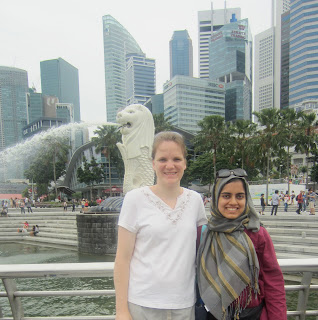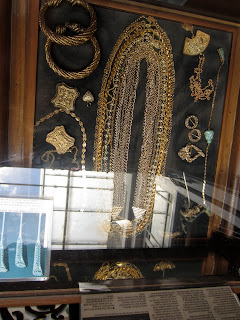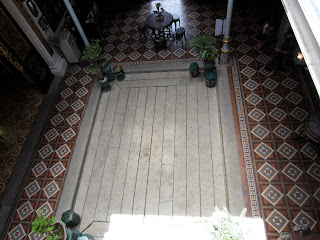Why Malaysia?
I am finishing up my medical school by doing my last rotation (for elective credit) in a foreign country. While on my interviews for residency, Dr. Tan in Maine was a wonderful hostess. I had such a great time with her while in Bangor. Dr. Tan, who is originally from Malaysia, offered to allow me to stay at her home (for free!) and do a rotation at a local hospital. So, I will be in Penang until May 23. I will be exploring and taking many adventures on the weekends and the last week, but I am based in Penang. If you look up, Penang, it is an island off the western coast of Peninsular Malaysia. I am just outside of Georgetown, and my hospital, Island Hospital is a private hospital in town.
Intro to Malaysia:
I am staying in the local part of Penang. I am surrounded by Malay, Chinese, Indian, Indonesian, and a few Japanese. I am taller than all females and some men, and do not look even part Asian, so I turn a lot of heads when I walk down the street or ride the bus. I am also bigger, so shopping would be interesting. Because of the Asian genes, all the clothing is small or if you are lucky medium. I am glad I brought sufficient clothing.
The weather: hot and humid or hot, rainy and humid. Apparently the temp is between 28-31C (or 85-90s) day and night. And, all the locals wear pants or skirts and button up shirts. When you walk around town, everyone is in professional dress, under umbrellas shielding themselves from the sun or rain. So far it has rained daily, just a quick storm and it moves on, sometimes multiple times a day.
Malaysian custom: always take your shoes off when entering any home. So when you visit someone, there is a line of shoes outside of the front door. I guess the number of shoes shows you how popular the people are!
Food: Is rice or noodles with chicken or fish or shellfish. The influence of India, Chinese, Malay results in wonderful food. I am not tired of it yet. They have wonderful spices that goes with it and there is somewhere to stop and eat on every corner. Yesterday I stopped at an Indian place and had wonderful Nan with curry and iced tea (think iced chai tea not Lipton iced tea). My favorite food is still ice kacang, I promise to take a picture the next time I eat it. And, this culture eats a lot. Everywhere I go I am offered food. I find myself eating at least 4 times if not 5 or 6 times a day!! (Thank goodness I have to walk a ways to work!)
There is a lot of UK influence here: everyone drives on the opposite side of the road, I find it unnerving to sit in the front seat. First off, I am in the driver seat. And, every time we turn, I think we are turning into head-on traffic! All the English that is spoken, is with a British accent and they use British words like lift, corridor, etc. Apparently, the health care system is modeled after Britain....free government health care or you can pay for private. (more later).
Buses: So, unlike Ecuador, the buses do stop at the bus stops. The adventure of the buses is that I have yet to find a bus schedule or a map of the routes. So, it is a guessing game. Thank you to Auntie Fung Lin, I at least know which bus to take to the hospital and which one to take home. The rest will just be trial and error with a map of town. If I get really lost, I am carrying a "hand phone" with numbers to my local Aunties and friends who promise that will come rescue me!!
Aunties: As per culture, any female older than me is an Auntie. I am staying with Auntie, who is Dr. Tan's mother. Auntie Ai Hwa is Dr. Tan's best friend and featured in the Nyonya museum. Auntie Keng Hong is Dr. Tan's sister-in-law who has internet and has taken care of me like one of her children or their fiances. She has two sons age 28 and 31. We are going out to dinner tonight (maybe American--KFC, Pizza Hut, McDonalds, although I don't miss it yet). I also attend church with them and am a part of her son's community group. Auntie Fung Lin is a retired nurse who showed me around on the buses, she took me to work and home the first day.
Rotation at Island Hospital:
I am shadowing different doctors at one of the private hospitals in Penang. The health care system is very different, but still very good. When you walk into the first floor of the hospital, you are greeted by the concierge desk, where you can check your luggage. In front of you is the receptionist desk, much like a hotel. There are two long hallways, each with airport seats (groups of 4) sitting back to back. Lining both sides of the hallway are glass doors with their own waiting rooms. They are labeled by doctor and specialty. My first reaction was that you shopped for your doc. I now understand that they all have their specialty and its much like a group in the U.S., the Island hospital group featuring internal med, surgery, orthopedic surgery, neurology, pediatrics, etc.
For outpatient, the doctors have one room that functions as their personal office, patient consultation and exam room. In one corner is the doctors desk perpendicular to the wall. There are some bookshelves above the desk. On the wall behind the desk and around to the adjacent wall are patient chart (they are still using paper charts). The nurse has a desk along the wall perpendicular to the doctor. She (I have not seen a male nurse) readies the charts, retrieves the patients, answers the phones, etc. On the opposite wall, where the door is, is the exam bed with tools next to it. So, the patient comes in, talks to the doctor at the desk, then doctor and patient go across the room for the examination and then return to the desk for assessment and plan.
The doctor (I haven't seen a female yet), was shocked when I told him that in the U.S. we stand up the whole day! In patient we go room to room, writing notes in the hallway. Outpatient, we also go exam room to exam room, writing notes in the hallway.
The doctors here work very hard. They have inpatient rounds before clinic at 9am, then afternoon rounds after clinic at 5 or 6pm. And in between they are called to the Accident & Emergency (ER) for consultation or by other doctors. And, somewhere in there they are supposed to complete their office work. Also, weekends they have clinic from 9am-1pm on Saturday. So really they are only off on Sundays, with the exception of being on call of course! From what I gather, they are on-call for their own patients 24/7. Oh, and a lot of the doctors leave and get their specialty training (residency) done in Scotland or UK, so you can see the UK influence again!
And, the patients all enter with a number, the order in which they show up. I guess appointments don't exist, so I guess they limit the number of people in the morning and afternoon(?) Of course they problem with that is the complicated or new patients vs. the follow-ups. It takes different amount of time to see each.
And, the patient population. To be a doctor here you need to have working knowledge of English (which all of your notes are in and communicate between staff), Malay, Hokkien (Chinese dialect). If you speak Indonesian, Japanese, Mandarin, Cantonese or Hindi, that's a bonus! So, I read over the shoulder as the doc is writing because I don't know any of these languages, Spanish is not spoken here. The patients are interesting.....because it is a private, fee for service, many docs will meet the requests of the patients. So, the Indonesians will come, with their luggage, get a routine medical exam including lab work and chest Xray and abdominal ultrasound, then stay and enjoy a vacation before returning to Indonesia!! (I am thinking medical tourism).
Tomorrow, I will get to see the inpatient. I am meeting my doctor early to go on morning rounds with him. More to come!
















































































